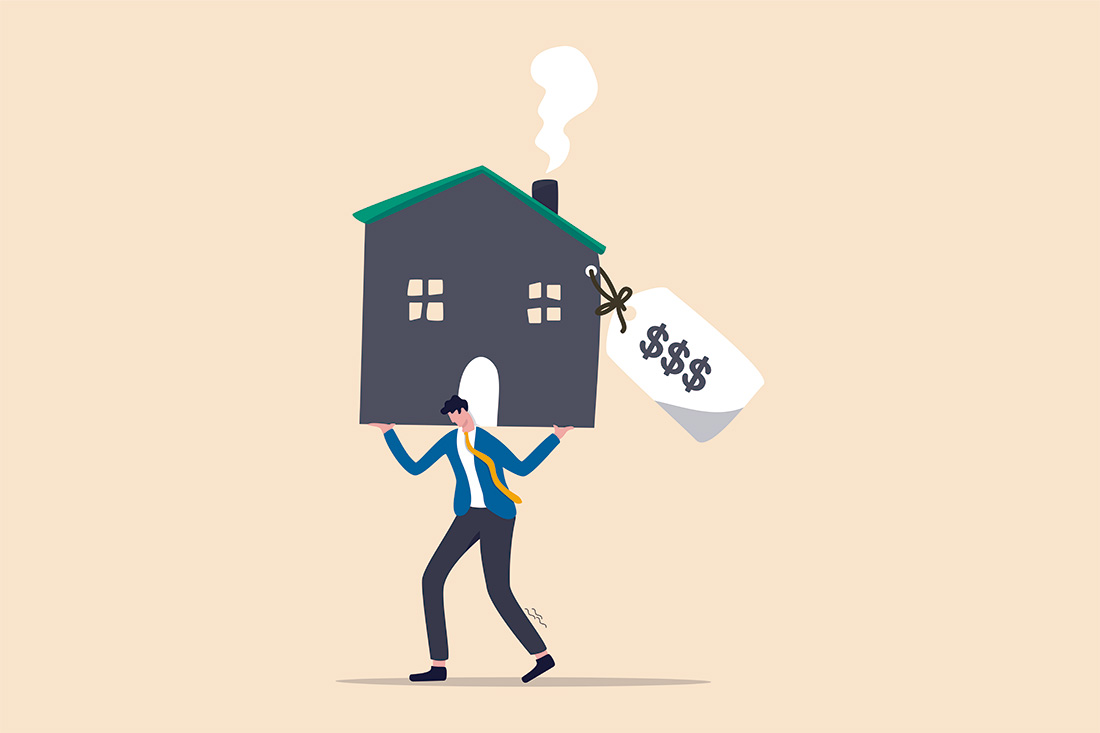
Have you ever heard the expression “Asset rich, cash poor” or alternatively “House rich, cash poor”? It is used to refer to persons who are not “poor” in the strictest sense of the word because they own valuable assets (such as a nice house with a swimming pool, two brand new cars, big screen TVs, expensive furniture, among other things) but who can be, at some moment in time, in a situation where the cash they have available is not enough to cover their cash flow requirements. In the lingo of realtors, bankers, and private mortgage lenders, someone who is “House rich, cash poor” is abbreviated by using the term “House Poor.”The Free Dictionary defines[1] House Poor as:
Most of one's income goes towards the high costs of one's home, such as mortgage or rent, property tax, utilities, etc., leaving very little money remaining for other expenditures.
How does one get to become House Poor?
Suppose one of our future private mortgage investor clients, knowing that they have a good amount of money saved which can be put towards a down payment, prepares with detail his/her family budget and comes to us looking for a private home loan as it turns out that he/she feels that, in their household, they could reasonably spend around 2,000 to 2,200 dollars per month on housing expenses “all-in.”
Let’s say, furthermore, that $2,200 represents about 26% of the household’s monthly income (meaning that the household earns about $101,000 during the year) and that they will be living comfortably but with limited luxuries. Knowing the above, our client finds a realtor to start looking at houses within the estimated budgeted range.
First, house hunting starts by looking at houses on the lower end of the range. They find that the houses in the $2,000 all-in ownership are “smallish,” so they decide to look at $2,200-ish houses. OK, these houses are “cute,” but they aren’t nearly as nice as the ones where the buyer is required to put a larger down payment and spend $2,850 per month (about 34% of our hypothetical clients’ monthly income).
Sure, maybe their budget will be a little tight if they pay the extra $450 per month, and with a larger down payment, they will have fewer savings left in the bank, but their minds and their guts say they can afford it “if they cut on expenses somewhere else.” Should they really do this? Can they really afford it? Just because it technically fits their budget does not mean purchasing a much more expensive house is advisable.
In a couple of paragraphs, this scenario is one first step and an easy way to becoming House Poor. All it takes for our clients to go down the slippery road toward financial instability is a downsizing event at their company, some accident requiring major medical expenses, or a new “unexpected” member of the family.
Another way to become House Poor, much more readily available to a regular Joe, is “keeping up with the Joneses.” When it comes to personal finances, it’s better to be the millionaire next door[2] than to be the House Poor guy living next to millionaires. And that takes, as should be evident, discipline.
How can you prevent becoming House Poor?
There are several “rules of thumb” or “heuristic rules” to help guide you when purchasing your house and deciding to embark on a private loan mortgage commitment. Investopedia has handily summarized some of them as follows (we have rephrased their ideas):
- One estimate of how much to spend on a home is 2.5 times your total gross annual salary, although some experts acknowledge that this figure will sometimes have to be quite a bit higher (it depends on your local real estate market). In the case of our imaginary client, that would mean purchasing a $252,500 house (at most).
- A second rule to help you determine how much you should spend “all-in” would be to calculate what percent of your monthly gross income will/should be spent on housing costs. In real estate financing, the rule of thumb is that this number should be no more than 28%. (If you recall, our imaginary client started at 26% but ended up at 34%).
- Make sure you choose the right mortgage from the right private mortgage lender. Opt for a fixed interest rate if you don’t want to get caught off guard by unexpected payment increases with a variable-rate mortgage.
- Keep some money aside for unexpected circumstances, such as unexpected maintenance and repairs or sudden changes to your financial position. A rule of thumb is that, not including your retirement fund, you should always have at least six months of living expenses set aside for a rainy day.
Is it worth it to be House Poor?
Most people experienced in homeownership will readily answer: No. This last is one of the reasons that many private lenders for mortgages, including AMI Lenders, will only approve you an amount that does not exceed a fixed percentage of the demonstrable earnings in your household.
As a private mortgage lender, we are interested in you building your financial wealth; we understand that you might desire a much larger house, but we will help you not to be House Poor by limiting the amount of your mortgage payments.
Summary
If you are looking for a hard money residential loan or commercial loan (“una hipoteca con un prestamista privado” in Spanish) in the Houston area, look no further. At AMI Lenders, we differ from traditional financial institutions in that we are in the business of helping our clients succeed in their real estate investments. Our advice as mortgage lenders is always geared toward financing the right investment property at the right price and with the appropriate loan terms.
If you want to purchase a property in Houston and its surrounding areas, consult with AMI Lenders. We are one of Houston's fastest hard money lenders when it comes to closings, and we will become your financial ally. We fund our loans and can close loans as fast as the law allows. Houston Borrowers will also have difficulty finding better rates for hard money loans or private loans than those we offer.
We want our customers to succeed and take advantage of the financial opportunities provided by investing in real estate. Visit our website today and fill out an application for a loan backed by a mortgage. We speak Spanish, by the way.
[1] https://idioms.thefreedictionary.com/house+poor
[2] https://en.wikipedia.org/wiki/The_Millionaire_Next_Door



